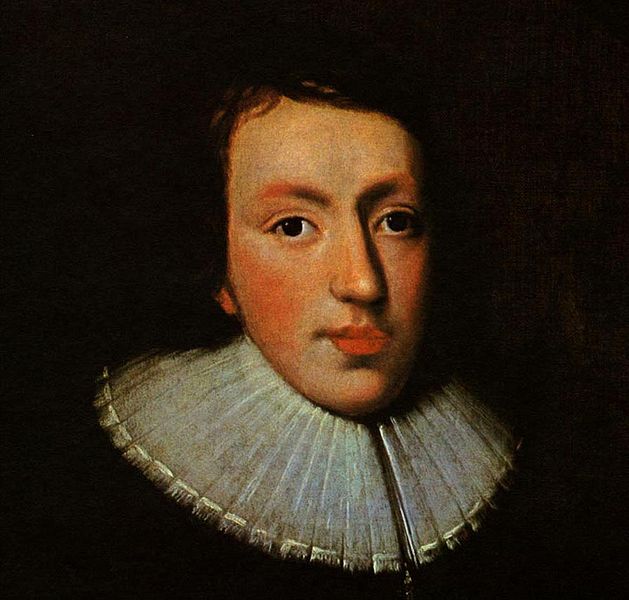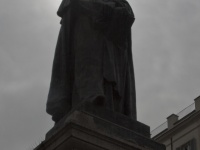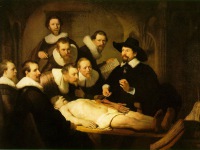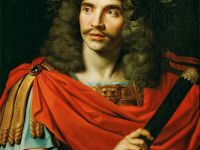
Portrait of John Milton (1608 – 1674), National Portrait Gallery, c 1629
On December 9, 1608, English poet, polemicist, a scholarly man of letters, and a civil servant John Milton, was born. He is best known for his epic poem Paradise Lost, the Biblical story of the Fall of Man: the temptation of Adam and Eve by the fallen angel Satan and their expulsion from the Garden of Eden.
“Of Man’s first disobedience, and the fruit
Of that forbidden tree whose mortal taste
Brought death into the world, and all our woe,
With loss of Eden, till one greater Man
Restore us, and regain the blissful Seat,”
— John Milton, Paradise Lost, Lines 1-5.
Early Years
John Milton was born in London in 1608 as the son of the composer John Milton and his wife Sarah Jeffrey. Because of his conversion to Protestantism John’s father had been disinherited by the strict wealthy Catholic grandfather. John Milton received his education first in his parents’ Puritan house, where his father prepared him to study literature, then in the school of St Paul’s School, until he was admitted to the Christ’s College of Cambridge University in 1624 at the age of 15. Already in early years he began attending plays and discovered his deep interest in poetry. After his graduation from Christ College in Cambridge with a Master of Arts in 1632, a few setbacks due to his dying mother and the death of his childhood friend Charles Diodati, he took off for a journey through Europe.
The European Grand Tour
He did not agree with the methods of teaching in schools and universities. In his opinion, they merely amounted to mechanical training. He rejected a theological study proposed by his father on the grounds that he would never be willing to be a slave to sign the articles of the episcopal church. During his European tour, Milton met Galileo Galilei [3,4] in Florence while under house arrest by order of the Inquisition, he met the Pope’s nephew and saw the famous Vatican Library.[5] These events highly influenced Milton and his style of writing. In this period he composed several poems in Latin language, including ‘Epitaphium Damonis‘, in memory to his recently passed friend.
The English Civil War
In the following years, Milton’s works were affected by the political changes in England. King Charles I began invading Scotland, the Long Parliament was convened and Milton wrote many pamphlets on the recent political and religious matters that distressed the society. When the Civil War broke out in the 1640’s, Milton wrote his ‘Divorce Tracts‘ pledging for divorce, which caused a great uproar in the parliament as well as the public. He wanted to leave the decision about the separation of a marriage not to the courts, but to the conscience of the man. At the same time Milton, busy with raising the children of some friends, wrote a book on education in which he called for free, truly classical youth education.
His participation in the political and church-critical movement began with five journalistic treatises (Prelatical episcopacy, Reason of church etc., 1641 and 1642), in which Milton turned against the tendencies in the Anglican Church to reapproach Catholicism by aggravating episcopal power. The Donation of Constantine, which would have founded the secular power and wealth of the Papal Church, Milton described in Dante‘s words as “the true box of Pandora“.[6] In these writings, he described Catholicism as a political party that sought priestly tyranny under the glow of a church. The teaching and the exercise of freedom were the themes of his life.
Meanwhile the Presbyterians had gained the upper hand in the “long parliament”; but they proved the same intolerance as the overthrown bishops and decided in 1643 that a license had to be obtained for the printing of every scripture. Then Milton addressed the parliament the Areopagitica (1644), with which he became one of the pioneers of the freedom of the press. The following four years (1645 to 1649) Milton worked on a “History of England in the Anglo-Saxon Epoch“. When the Republican Party came to power, the governing parliamentary committee appointed him secret clerk to the State Council for the Latin copies.
The Execution of Charles I
In this important and influential position, which he held throughout the Republic, Milton published in 1649 The tenure of kings and magistrates, a paper begun before the death of the king, an unconditional justification of the execution of Charles I on the basis of natural law. In return, the Bishop of Exeter wrote Eikon basilike, the image of His holy Majesty in His solitude and agony. The anonymous book, which he published for the King’s estate, was soon distributed in 47 editions throughout the country and became very popular. Milton responded with his writing Eikonoklastes (“Iconoclasts“), in which he revealed the author’s name and flagellated the monarch’s oath of allegiance. This public misconduct was more important than private virtues.
His vision, which had already deteriorated early on, was now completely extinguished. Some smaller pamphlets for a free republic followed Upon the model of common Wealth, Ready and easy Way to establish a free common Wealth.
Still, Milton had to face many losses. He lost his father, grandfather, he lost his sight which caused him to write the sonett ‘When I Consider How My Light is Spent‘ and in the year after, he lost his wife as well as his one year old son. These incisive events were often handled by Milton through the numerous poems he published.
Milton’s Persecution
Milton’s political writings served the politics of Cromwell, whose hope was to tie together the entire Protestant name in brotherly harmony and to oppose this collective power to the House of Habsburg. After the fall of the Republic and the restoration of the Stuarts, Milton was subjected to harsh persecution by the Royalists and Presbyterians. On June 16, 1660, the Defensio was publicly burned by the executioner, and only the intercession of influential friends succeeded in freeing the already arrested poet. Milton now withdrew into private life. His first wife died in 1652. On 12 November 1656 he married Katharine Woodcock, who died shortly afterwards. The third marriage, which the 50-year-old blind man in need of help entered into with three children to persuade his friends, was as unhappy as the first. In addition, his fortune was lost in the civil war and his house was destroyed in the great fire of London in 1666.

Incens’d with indignation Satan stood
Unterrify’d, and like a comet burn’d
That fires the length of Ophiuchus huge
In th’ arctic sky, and from his horrid hair
Shakes pestilence and war.
— John Milton, Paradise Lost, Line 707.
Paradise Lost
In the 1660’s, Milton was able to fulfill his probably greatest work, the epic Paradise Lost, which he finished despite his blindness. It was published in 1667 in a total of ten books and Milton faced instant success with his masterpiece.
Paradise Lost, the poem that is considered to be one of the greatest literary works in English language, deals with Adam and Eve, their temptation by Satan, and their banishment from the Garden of Eden. Milton illustrated two different narrative perspectives. The one of Adam and Eve, having a full relationship without sin, and having passions as well as distinct personalities. The other perspective focuses on Satan, who successfully convinces Eva to eat from the tree in order to take revenge on God and seduce his greatest creature, the human. After Adam finds out, Eva has sinned, he declares that he also has to die since she was made from his flesh, which makes Adam a heroic figure. However, the couple is banished from the Garden of Eden and is from then on pictured with a quite distant relationship to God.
This important work of religious poetry, which deals with the struggle between heaven and hell, God and the devil, has had a considerable influence on literature and other cultural spheres up to the present day. John Milton succeeded so well in depicting the figure of Satan in comparison to the relatively pale, sober elaboration of the person of God that the poet William Blake described John Milton as “Satan’s partisan ignorantly”: “he was a true Poet and of the Devil’s party without knowing it”. The contemporary founders of “Satanism” referred to Milton. In the 18th century Paradise Lost published almost twice as many reprints as Shakespeare’s dramas. In the 20th century John Milton (or rather his poetry) was both sharply attacked (T. S. Eliot 1936, later relativized) and euphorically defended (exemplarily C. S. Lewis 1942).
Milton later wrote Paradise Regained, which has the temptation of Christ in the desert as its subject, but has reached considerably fewer readers.
When Milton died in 1674, he casted a formidable shadow over English poetry which lasted even through the 18th and 19th centuries. Actually, he was often judged equal or superior to all other English poets, including Shakespeare.
John Rogers, 1. Introduction: Milton, Power, and the Power of Milton, [10]
References and Further Reading:
- [1] The Life and Work of John Milton at the Online Library of Liberty
- [2] John Milton Website
- [3] Galileo Galilei and his Telescope, SciHi Blog
- [4] The Galileo Affair, SciHi blog
- [5] Bartolomeo Platina and the Vatican Library, SciHi Blog
- [6] Dante Alighieri and the Divine Comedy, SciHi Blog
- [7] The Great Fire of London, SciHi Blog
- [8] Works of or about John Milton, at Wikisource
- [9] John Milton at Wikidata
- [10] John Rogers, 1. Introduction: Milton, Power, and the Power of Milton, YaleCourses @ youtube
- [11] Jenks, Tudor (1905). In the Days of Milton. New York: A.S. Barnes & Company.
- [12] Stephen, Leslie (1902). . Studies of a Biographer. Vol. 4. London: Duckworth & Co. pp. 86–129.
- [13] Works by or about John Milton at Internet Archive
- [14] Timeline for John Milton, via Wikipedia





